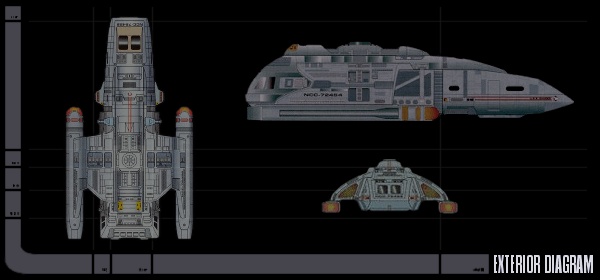-
Overview
-
| Affiliation |
United
Federation of Planets |
| Used by |
Starfleet |
| |
|
| Classification |
Multimission long range warp
shuttle |
| Designing phase |
2363-65 |
| Prototyping phase |
2365-68 |
| Operational phase |
2368- |
| Construction yards |
Utopia Planitia Fleet Yards, Mars |
| Ships constructed |
Hundreds |
| Description |
Small, versatile ship class of the
middle and late 24th century that is a successor of the shuttle with increased cargo
capacity and more efficient propulsion systems, being mainly used for personal or cargo
transports. Furthermore, it is used for research, scout and inspection missions because of
its small size. The large variety of possible tasks is due to the design of the middle
hull as an exchange module, so that the ships, also called "runabout", can be
equipped with personal, cargo or sensor modules, depending on the mission type. As
autonomous long range ships, the Danube class vessels are mainly assigned to deep space
stations and big starbases near or beyond the border of the Federation, replacing the
missing provision of starship services for these sectors. |
-
Ships constructed
-
| Name |
Registry number |
Used
from |
to |
Location |
| USS Danube (prototype) |
NX-72003 |
2368 |
|
|
| USS Rio Grande |
NCC-72452 |
2369 |
2373 |
Deep Space Nine |
| USS Yangtsekiang |
NCC-72453 |
2369 |
2369 |
Deep Space Nine |
| USS Ganges |
NCC-72454 |
2369 |
2370 |
Deep Space Nine |
| USS Mekong |
NCC-72617 |
2370 |
2371 |
Deep Space Nine |
| USS Orinoco |
NCC-72905 |
2370 |
2372 |
Deep Space Nine |
| USS Rubicon |
NCC-72936 |
2371 |
|
Deep Space Nine |
| USS Yukon |
NCC-72602 |
2372 |
2373 |
Deep Space Nine |
| USS Shenandoah |
NCC-73024 |
2372 |
2374 |
Deep Space Nine |
| USS Volga |
NCC-73196 |
2372 |
|
Deep Space Nine |
| USS Gander |
|
2375 |
2375 |
Deep Space Nine |
-
- History
-
| 2363 |
The runabout project emerges from
a Starfleet study for a versatile, compact science, personal and supplies ship,
supplementing the restricted shuttles. The goals of the new Danube class project were
pretty high: scientific exploration, personal transport, quick place-to-place transport of
cargo modules as well as emergency and tactical missions. |
| 2365 |
After finishing the designing
phase, the Utopia Planitia Fleet Yards are commissioned to construct the prototype of the
class, the USS Danube. |
| 2368 |
First test flights with the
protoype in the atmosphere of Mars after 3 years of construction. |
|
While the USS Danube starts warp
test flight in the solar system, the first production line of runabouts is already
in the completion phase. |
| 2369 |
The first 5 Danube class ships are
comissioned: the USS Rio Grande, the USS Mekong, the USS Orinoco, the USS Yangtzee Kiang
and the USS Rubicon. They are merely the first ships of a great number of runabouts being
constructed in the following period. |
-
- Technical specifications
-
| Dimensions |
Length 23.1 m, width 13.7
m, height 5.4 m |
| Mass |
Unknown |
| Structure |
Main hull consisting
of seven components, with cockpit section which can be seperated in emergency situations,
exchange module, propulsion section and 2 warp nacelles attachted to the ship by
pylons. |
| Crew complement |
4 members of flight
crew, 40 passengers |
| |
|
| Computer
systems |
1 isolinear twin core
in the base of the cockpit (2.3
x 2.1 x 1.3m); |
|
186 isolinear banks,
53 command preprocessors |
| Propulsion
systems |
|
| Warp drive |
Very compact,
linear-radial warp core for M/AM power generation |
|
2 warp nacelles |
|
Maximum speed warp 4.7 |
| Impulse
drive |
2 impulse engines with
8 impulse reactors and spacetime coils |
| Maneuvering
drive |
RCS thrusters |
| Weapon
systems |
6 phaser strips
type VIII |
|
Front micro torpedo
launcher (optional) |
| Defensive
systems |
Deflector shields |
| Other
systems |
Tractor beam emitters |
| Equipment |
Medical kits,
independent communications module, emergency rations, phaser type II, 4 emergency pressure
suits |
-
|
